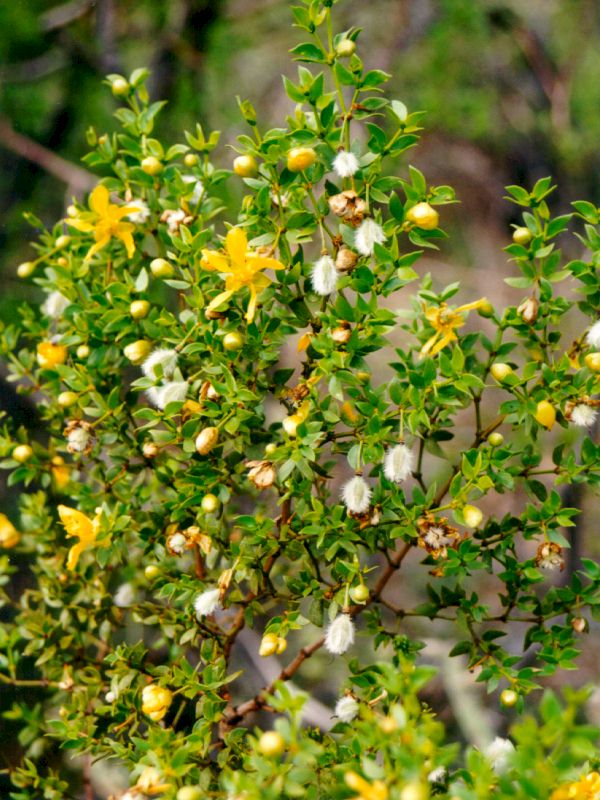Herbs: Larrea Tridentata (Creosote Bush)
FAMILY: Zygophyllacea
COMMON NAMES: Chaparral, Creosote bush, creosotum
PART USED: leaves, tinctured or dried for tea

DOSAGE: Controversial. FDA has "removed this botanical from public access" due to potential liver toxicity. Nevermind that anyone could harvest bushels of it from many desert roadsides. Recommended dose has always been small. Discontinue if signs of jaundice.
GENERAL: Smells lovely in the Sonoran desert when it rains. Poisons the soil in which it grows so that nothing else will grow there. Left alone for long enough it will leave large areas of the desert without plant life, and a circle of creosote bushes around the edge.
HABIT: Evergreen shrub with small yellow flowers, found in the desert southwest US and Mexico. Collect in spring. Thrives where rainfall is under 15"/year. Tough stems, leaves sticky when handled, very distinctive odor. No thorns or spines. Olive drab color--different from all other shrubs of the desert and distinguishable from a distance.
CONSTITUENTS:
--norhydroguiuratic acid (NHGA, antioxidant)
--flavonoids incl quercetin
--waxes
--saponins
--resins
--volatile oils
--alkaloids
ACTIONS
--antioxidant
--anti-inflam
--anti-microbe
--anti-neoplasm
--alterative
--antiseptic
INDICATIONS
--autoimmune incl SLE
--cancer
--decrease platelet agg
--external skin lesion
--dental infx
SOURCES:
--course notes (Nagle)--looks to me like Nagle got his notes from this website-->
http://www.naturalopinion.com/nmp/nmp5/Larrea.htm
COMMON NAMES: Chaparral, Creosote bush, creosotum
PART USED: leaves, tinctured or dried for tea

DOSAGE: Controversial. FDA has "removed this botanical from public access" due to potential liver toxicity. Nevermind that anyone could harvest bushels of it from many desert roadsides. Recommended dose has always been small. Discontinue if signs of jaundice.
GENERAL: Smells lovely in the Sonoran desert when it rains. Poisons the soil in which it grows so that nothing else will grow there. Left alone for long enough it will leave large areas of the desert without plant life, and a circle of creosote bushes around the edge.
HABIT: Evergreen shrub with small yellow flowers, found in the desert southwest US and Mexico. Collect in spring. Thrives where rainfall is under 15"/year. Tough stems, leaves sticky when handled, very distinctive odor. No thorns or spines. Olive drab color--different from all other shrubs of the desert and distinguishable from a distance.
CONSTITUENTS:
--norhydroguiuratic acid (NHGA, antioxidant)
--flavonoids incl quercetin
--waxes
--saponins
--resins
--volatile oils
--alkaloids
ACTIONS
--antioxidant
--anti-inflam
--anti-microbe
--anti-neoplasm
--alterative
--antiseptic
INDICATIONS
--autoimmune incl SLE
--cancer
--decrease platelet agg
--external skin lesion
--dental infx
SOURCES:
--course notes (Nagle)--looks to me like Nagle got his notes from this website-->
http://www.naturalopinion.com/nmp/nmp5/Larrea.htm